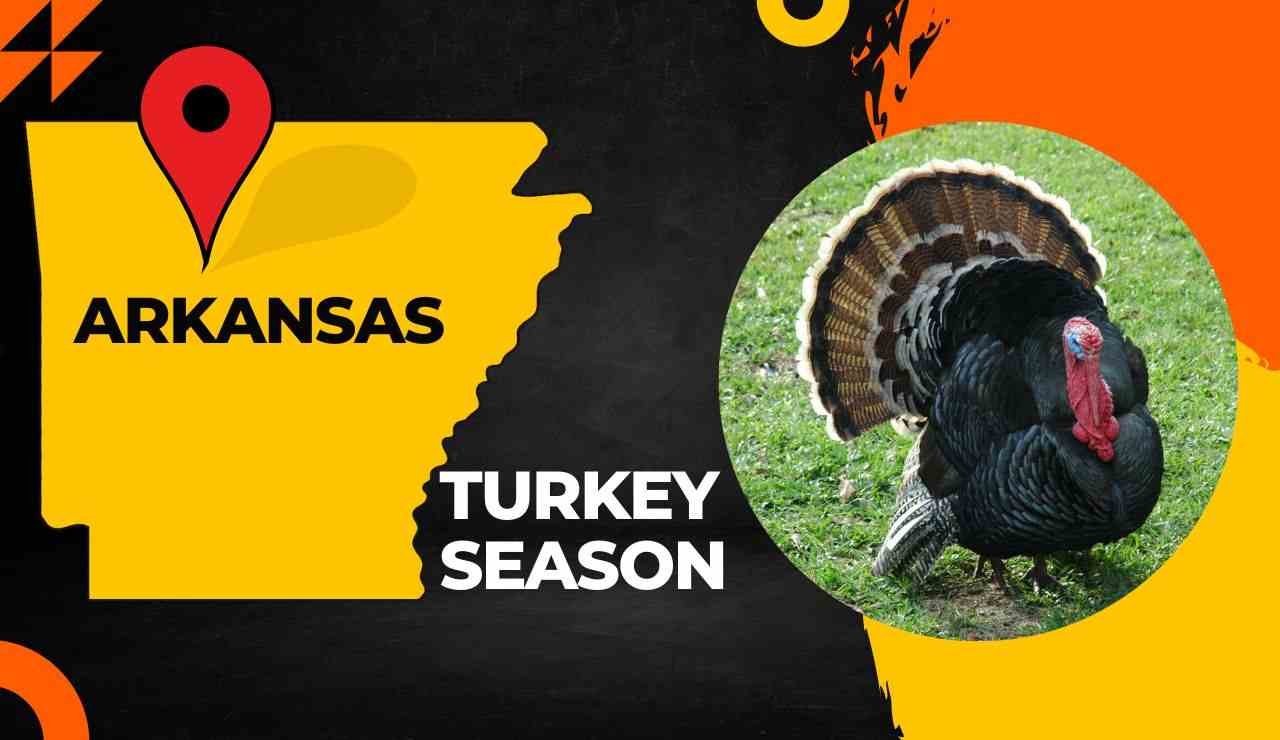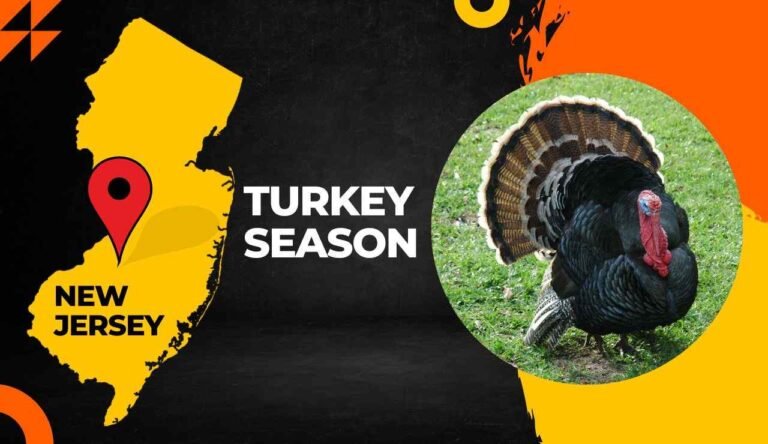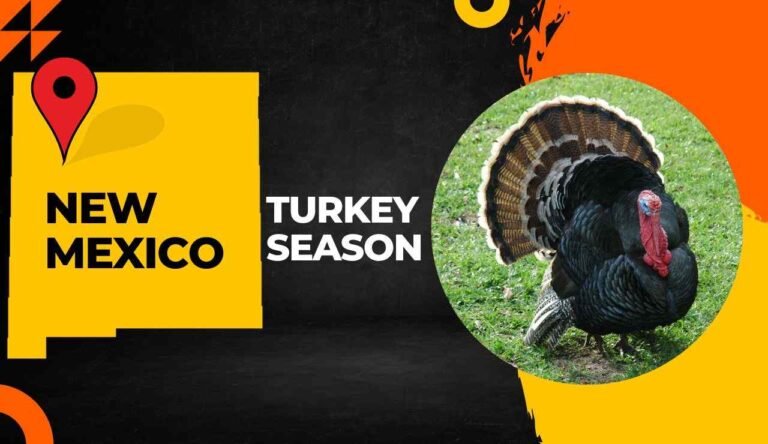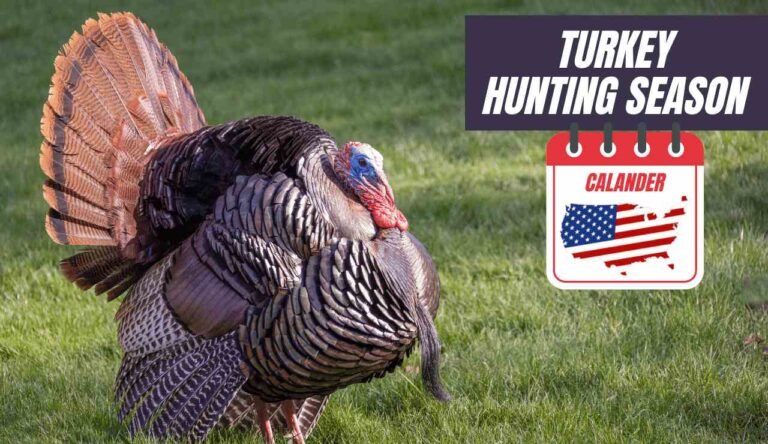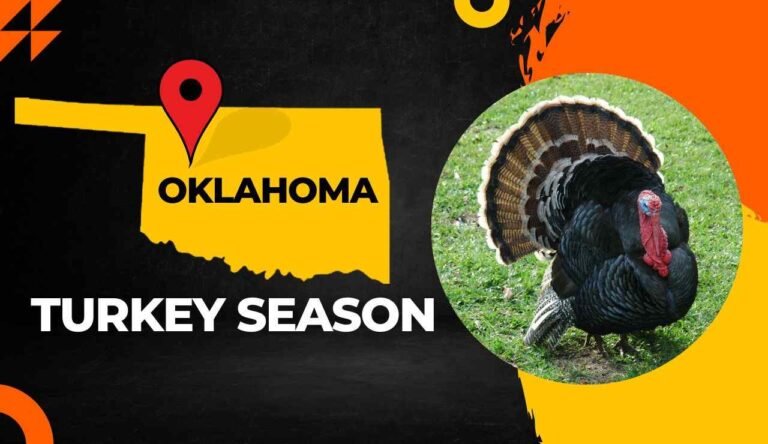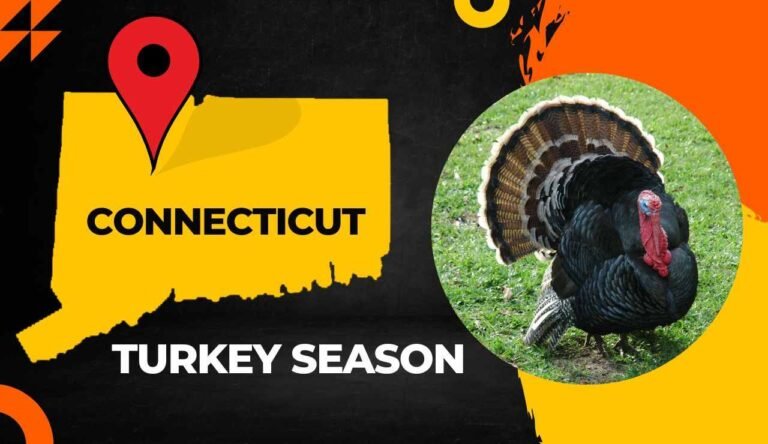Arkansas Turkey Season 2025-2026: [Dates, Bag Limits, Regulations & Licenses]
If you’ve been counting down the days until spring gobbler hunts roll around again, I’ve got some news that’ll have you checking your gear twice. The Natural State has completely revamped its structure for the 2025-2026 cycle—and trust me, these changes are worth understanding before you head into the woods.
This comprehensive guide breaks down everything from the newly expanded zone system to licensing requirements, bag limits, and even a few insider tips on chasing those Eastern wild birds through the Ozarks and Ouachita Mountains. Whether you’re a resident who’s been calling gobblers since you could walk or a non-resident planning your first hunt in the Natural State, you’ll find the dates, regulations, and practical info you need right here.
Quick Reference: Key Dates & Species Overview
Here’s your at-a-glance table showing what’s legal, when you can hunt, and how to pursue these magnificent birds:
| Bird Type | Open Dates (2026) | Close Date | Legal Methods | Bag Limit |
|---|---|---|---|---|
| Wild Gobbler (Zone 1) | April 20 | May 10 | Shotgun (10-gauge or smaller), Archery, Crossbow | 2 legal birds statewide* |
| Wild Gobbler (Zone 1A) | April 20 | April 28 | Shotgun (10-gauge or smaller), Archery, Crossbow | 2 legal birds statewide* |
| Wild Gobbler (Zone 2) | April 13 | May 3 | Shotgun (10-gauge or smaller), Archery, Crossbow | 2 legal birds statewide* |
| Wild Gobbler (Zone 2A) | April 13 | April 21 | Shotgun (10-gauge or smaller), Archery, Crossbow | 2 legal birds statewide* |
| Wild Gobbler (Zone 3) | April 6 | April 26 | Shotgun (10-gauge or smaller), Archery, Crossbow | 2 legal birds statewide* |
| Youth Special Hunt (Zones 1, 1A, 2, 2A) | April 11 | April 12 | Shotgun, Archery, Crossbow | 1 legal bird or jake |
*Only one legal bird may be taken during the first seven days of each zone’s regular season. Daily limit: 1 bird. Non-residents limited to 1 bird total.
📅 All Arkansas Wild Gobbler Seasons 2025-2026: The Complete Breakdown
The Arkansas Game and Fish Commission (AGFC) made significant changes for 2026, expanding from two zones to five distinct zones with staggered opening dates. This means hunters across different regions get opener times that better align with peak gobbling activity in their area. Pretty smart, right?
Detailed Season Dates by Zone
| Zone | Opening Day | Closing Day | Total Days | Region Coverage |
|---|---|---|---|---|
| Zone 3 | April 6, 2026 (Monday) | April 26, 2026 | 21 days | Southern lowlands & Mississippi Delta region |
| Zone 2 | April 13, 2026 (Monday) | May 3, 2026 | 21 days | Coastal plain & lower elevations |
| Zone 2A | April 13, 2026 (Monday) | April 21, 2026 | 9 days | Select WMAs in Zone 2 |
| Zone 1 | April 20, 2026 (Monday) | May 10, 2026 | 21 days | Northern mountains & higher elevations |
| Zone 1A | April 20, 2026 (Monday) | April 28, 2026 | 9 days | Select WMAs in Zone 1 |
Special Youth Hunt: April 11-12, 2026 (Saturday-Sunday) in Zones 1, 1A, 2, and 2A only. No youth hunt in Zone 3.
Understanding the Tag System 🎟️
Starting with the 2025 period, the AGFC implemented a mandatory tagging system to better track hunter participation. Here’s what you need to know:
- Residents: Obtain free Arkansas Turkey Hunting Tags (labeled RTT for adults, YTT for youth) through the AGFC licensing system
- Non-residents (adults): Purchase Nonresident Turkey Tag (NRTT) for $100 or the Nonresident Annual Turkey Hunting License (NRTL) for $325 (includes tag)
- Non-residents (youth): Free youth tag available
These tags are separate from your base hunting license and are required to legally pursue or harvest any wild gobbler. Think of them as your official reservation to join the spring woods ritual.
Bag Limits & Harvest Rules
The statewide bag limit is two legal gobblers (bearded birds only—no jakes or hens for adults). However, there’s a catch: you can only harvest one legal bird during the first seven calendar days of your zone’s regular period. After that week, you can pursue your second bird.
Additional restrictions:
- Daily limit: 1 bird per day
- Non-residents: 1 bird total for the entire spring
- Wildlife Management Areas (WMAs): 1 legal gobbler per WMA
- Absolutely NO hen harvests, including bearded hens
- Youth hunters (6-15 years) during the special youth hunt: 1 legal bird or 1 jake
🦅 Related Bird Species: More Feathers to Pursue
While spring gobbler hunting gets most of the spotlight, the Natural State offers fantastic opportunities for other upland birds throughout the year. Here’s what else you can chase:
Mourning Doves 🕊️
- Dates: September 6 – October 26, 2025 | December 8, 2025 – January 15, 2026
- Daily Bag: 15 birds
- Legal Species: Mourning doves, white-winged doves, Eurasian collared-doves
- Note: Steel shot required on certain WMAs with dove fields
Bobwhite Quail 🌾
- Dates: November 1, 2025 – February 1, 2026
- Daily Bag: 6 birds
- Possession Limit: 12 birds
- The Natural State has been working hard on habitat restoration for these iconic upland birds
Waterfowl Hunting
While we’re focused on upland birds here, don’t forget that the Natural State is legendary for duck hunting along the Mississippi Flyway. If you’re into pursuing multiple bird species, check out the Alabama season guide for comparison with neighboring states’ waterfowl regulations.
📋 Arkansas Wild Gobbler Regulations: Know Before You Go
Let’s talk about the rules that keep everyone safe and ensure future generations can enjoy these spring hunts. The AGFC takes these seriously, and so should you.
Legal Hunting Methods
Allowed:
- Shotguns (10-gauge or smaller)
- Archery equipment (vertical bows and compound bows)
- Crossbows (minimum 125-pound pull with mechanical safety)
Shot Restrictions:
- Shot size No. 2 or smaller (common shot)
- Larger shot is prohibited
Not Allowed:
- Rifles or pistols
- Electronic calls (except for certain mobility-impaired hunters with permits)
- Hunting over bait (area considered baited for 10 days after complete removal)
- Shooting from vehicles or public roads
- Using live decoys
Important Hunting Hours & Safety Rules
- Hunting hours: 30 minutes before official sunrise until official sunset
- Hunter orange requirement: While not required for spring gobbler hunting, it’s strongly recommended when moving through the woods
- Archery-only rule: You cannot possess a firearm while hunting with archery equipment (exceptions during overlapping firearms seasons)
- No harassment: It’s illegal to intentionally interfere with another hunter’s lawful pursuit
Baiting Prohibition
This one trips up folks every year. It’s unlawful to hunt over any baited area or location where you “reasonably should know” baiting has occurred. An area remains baited for 10 full days after all bait is completely removed. That corn feeder you use for deer? Yeah, you need to account for that 10-day buffer before pursuing gobblers nearby.
💰 Arkansas Wild Gobbler License & Tag Fees
Hunting in the Natural State is remarkably affordable for residents, though non-residents should budget accordingly. Here’s the complete fee breakdown:
Resident Fees
| License/Tag Type | Cost | What It Includes |
|---|---|---|
| Resident Sportsman’s License (RS) | $25.00 | Annual hunting privileges |
| Combination Sportsman’s License (CS) | $35.50 | Hunting + Fishing combo |
| Resident Turkey Tag (RTT) – Adult | FREE | Required to hunt/harvest gobblers |
| Youth Turkey Tag (YTT) | FREE | For hunters ages 6-15 |
| Lifetime Sportsman’s License | Varies by age | One-time purchase, lifetime validity |
Non-Resident Fees
| License/Tag Type | Cost | What It Includes |
|---|---|---|
| Nonresident Annual Hunting License | $300.00 | Base hunting privileges |
| Nonresident Annual Turkey Hunting License (NRTL) | $325.00 | Includes turkey tag + hunting privileges |
| Nonresident Turkey Tag (NRTT) | $100.00 | Add-on to annual license |
| Non-Resident Youth Tag | FREE | For youth hunters 6-15 years |
Money-Saving Tip: If you’re a non-resident planning to hunt multiple species or make several trips, the $325 NRTL (which includes the tag) costs only $25 more than buying a base license + tag separately. It’s an easy decision for most out-of-state hunters.
For hunters looking at multi-state pursuits, you might also check out Nebraska’s regulations or Arizona’s opportunities for different subspecies experiences.
📜 Arkansas Wild Gobbler License Requirements
Before you can legally pursue gobblers, you’ll need to meet these requirements:
Who Needs a License?
- All hunters 16 years and older must have a valid hunting license
- Hunters 6-15 years old need a free Customer Identification Number (CID) to check harvests
- Hunters under 6 years do not need a license but must be supervised
Hunter Education Requirements
- Born after December 31, 1968: Must complete an approved hunter education course
- Apprentice hunters: Can hunt without completing the course if under direct supervision of someone 21+ who holds a valid license
How to Obtain Your License & Tags
- Create or access your customer profile at the Arkansas Game and Fish Commission licensing portal
- Complete hunter education if required (can verify your certification will be in the system)
- Purchase your base hunting license (resident or non-resident)
- Add free turkey tags to your cart (residents) or purchase NRTT/NRTL (non-residents)
- Complete checkout and print or save digital licenses to your mobile device
Pro tip: Download the AGFC mobile app to keep your license and tags readily accessible in the field. Cell service can be spotty in prime gobbler country, so having offline access is clutch.
❓ Arkansas Wild Gobbler Hunting FAQs
Q: Can I use a turkey call while hunting on public land?
A: Absolutely! Calling is not only legal but practically essential for spring gobbler hunting. Just be aware that electronic calls are prohibited except for hunters with specific mobility-related permits issued by the AGFC.
Q: What’s the difference between a jake and a legal gobbler?
A: A jake is a juvenile male bird (typically in its first year). Legal gobblers are mature birds with full beards. During the regular adult period, you can only harvest mature gobblers. However, youth hunters during the special April 11-12 youth hunt can harvest jakes.
Q: Do I need to check my harvest?
A: Yes! All harvested gobblers must be checked through the AGFC’s game checking system within 24 hours of harvest. You can check online, via the mobile app, or by calling the automated phone system. Keep your confirmation number as proof.
Q: Can I hunt gobblers on Wildlife Management Areas (WMAs)?
A: Yes, but some WMAs require special permits obtained through a lottery drawing. The application period typically runs January 15 – February 15, with drawings around February 20. There’s a $5 non-refundable application fee per hunt type. WMAs also have a 1-bird bag limit regardless of your statewide limit.
Q: What parts of the Natural State have the best populations?
A: The Ouachita National Forest region is widely recognized as having the highest populations in the state. However, increased hunting pressure has made it more competitive. Don’t overlook the Mississippi Delta region (Zone 3) or areas in Zones 2 and 2A—these can offer excellent hunting with less pressure.
Q: Are hen decoys legal?
A: Yes, turkey decoys (including hen and jake decoys) are legal. However, be extremely cautious about hunter safety when using decoys. Always set them up in clear view, wear your hunter orange when moving, and never stalk or pursue a gobbler without being absolutely certain of your target.
Q: Can I shoot a bearded hen?
A: No. Effective immediately, it’s illegal to harvest any hen, even if she has a beard. The AGFC changed this regulation to protect breeding populations.
Q: What if I harvested a bird in Zone 3 during the first week—can I hunt another zone?
A: Yes, but remember the first-week restriction applies per zone. If you took a bird during the first seven days of Zone 3, you’d need to wait until day eight of any other zone before harvesting a second bird. The restriction is zone-specific, not statewide-date-specific.
🎯 Wrapping It Up: Your 2025-2026 Natural State Gobbler Roadmap
The Natural State’s new five-zone system gives hunters more flexibility and better opportunities to match regional gobbler activity peaks. Whether you’re chasing longbeards through the rugged Ouachitas, working river bottom birds in Zone 3, or calling mountain gobblers in Zone 1, understanding these dates and regulations will keep you legal and increase your chances of tagging out.
Remember: get your tags early (they’re free for residents!), scout your properties ahead of opening day, and always double-check WMA-specific regulations if you’re hunting public ground. The spring woods are calling—literally—and there’s nothing quite like the adrenaline rush of a fired-up gobbler answering your first yelp of the morning.
Be safe, be ethical, and enjoy every sunrise in the spring woods. Tight patterns and thunderous gobbles to you all!
⚠️ Official Disclaimer
This article provides a comprehensive summary of the 2025-2026 Natural State wild gobbler hunting regulations based on information available as of October 2025. However, regulations can change. Always verify current dates, bag limits, zone boundaries, and legal requirements with the Arkansas Game and Fish Commission official regulations before heading afield. When in doubt, contact your local AGFC office or conservation officer. Hunt responsibly, respect wildlife, and help ensure these traditions continue for future generations.
Happy hunting, and may your spring woods echo with gobbles! 🦃🌲
- Louisiana Turkey Season 2026: LA Turkey Hunting [Dates, Regulations, Licenses & More] - January 5, 2026
- Kentucky Turkey Season 2026: Latest Hunting Dates, Regulations & Licenses! - January 5, 2026
- Kansas Turkey Season 2026-2027: Latest Dates, Licenses, and Regulations Now Available! - January 3, 2026
